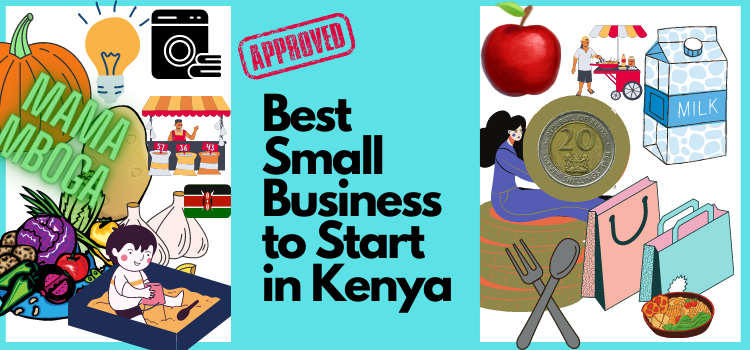According to KAM, there are7.41 million micro-SMEs in Kenya (these are tiny businesses like Mama Mboga stalls and small retail shops).
One problem with these businesses is that 7 out of every 10 fail within 3 years of starting. That means it is important to research before getting started on an idea.
This article is a deep dive into the small businesses in Kenya.
Businesses you can start with 1k to 2k
Some of the popular businesses that you can start with Kshs. 1,000 – 2,000 includeHawking coffee and buns, Hawking smokies, sausages, and eggs, Selling ice cream, Hairdressing (Mobile), Car Wash (Mobile), Selling Second Hand Clothes (Mitumba), Selling Second Hand Books, Selling CBC materials, Vegetable farming, Graphic design, housekeeping Airbnb, and Selling Fruits.
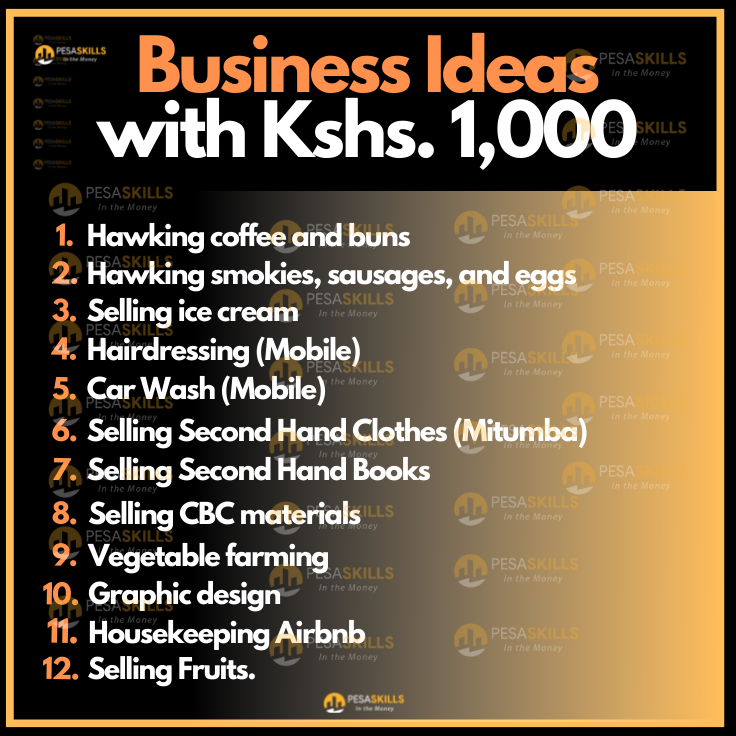
The following table shows a summary of businesses that you can start with a capital of between Kshs. 1,000 and Kshs. 2,000 in Kenya and the estimated profit you can earn from each business per day. These are also some of the cheapest businesses that you can start.
| Business Name | Requirements | Estimated Daily Profits |
| Hawking coffee and buns | 3-liter coffee or tea dispenser, plastic party cups, mandazi or buns, and a dustcoat | Kshs. 300 |
| Hawking smokies, sausages, and eggs | Boiled eggs, cooked sausages and smokies, bucket, kachumbari (tomatoes, green pepper), salt, bucket, small food container, metallic spoon to crack shells, small knife, dust coat. | Kshs. 500 |
| Selling ice cream | Ice cream box, cone cups, scooping spoon, ice cream flavors, dust coat | Kshs. 400 |
| Hairdressing (Mobile) | Hairstyling skills, hair products (shampoo, gel, relaxer, etc), carry bag, combs, apron, and blow dryer | Kshs. 600 |
| Car Wash (Mobile) | Water pump, long pipe, wash clothes, car shampoo, car cleaning products, brush, apron. | Kshs. 600 |
| Selling Second Hand Clothes (Mitumba) | Large sack, a 2m*2m polythene bag, large carton box, a few hangers, prime location, a small bale of second-hand clothes | Kshs. 400 |
| Selling Second Hand Books | A variety of second-hand books, a large carton box, a large sack | Kshs. 600 |
| Selling CBC materials | CBC materials for kids e.g. old tires, artificial mud, wire, and art and craft materials | Kshs. 400 |
| Vegetable farming | Several buckets with soil, a small area to place buckets, seeds, a watering can, or a jerrycan with holes. | Kshs. 200 |
| Personal driver | Driving license, certificate of good conduct | Kshs. 800 |
| Graphic design | Access to a cybercafe, social media page, and graphic design skills. | Kshs. 300 |
| Housekeeping Airbnb | Cleaning products, organizing skills, keen on aesthetic details. | Kshs. 400 |
| Selling Fruits | Large flat carton box, large sack, small carton box for storage, clean water in a jerrycan, knife, plastic carry papers, trash can. | Kshs. 1,000 |
Businesses you can start with 5,000 to 10,000
Some of the small businesses that you can start with Kshs 5,000 – 10,000 includesSelling Handmade Crafts (Beads, sculptures, keyholders, sandals, etc.), Underwear Vending, Selling Hats, Selling phone accessories, Selling second-hand women’s shoes, Shoe polishing repair shop, Selling ready-to-eat fruits (sliced watermelons and pineapples), Selling vegetables, Selling Charcoal, and Selling snacks (Samosa, smokies, eggs, sausages).
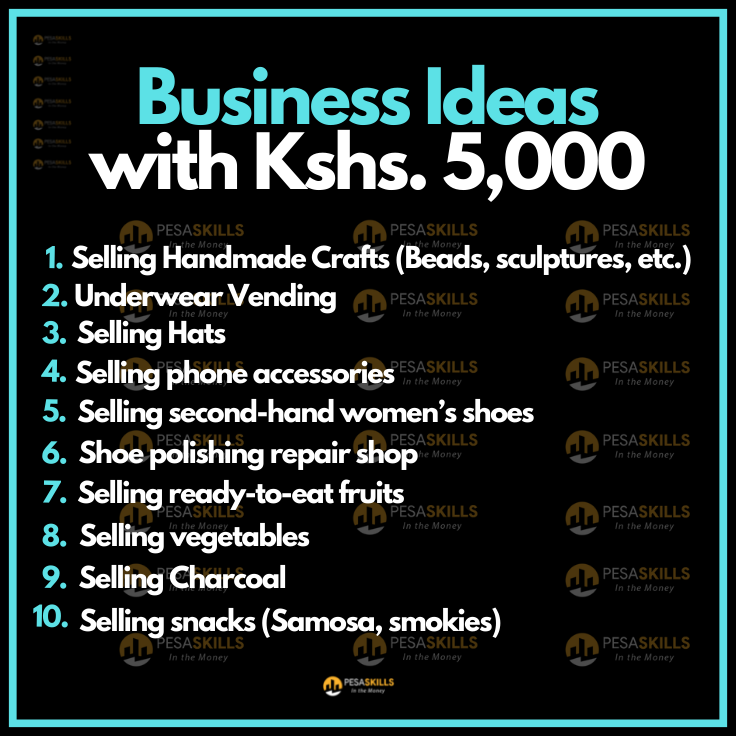
The table below shows a list of these businesses, the requirements to start, and estimations of profits per day.
| Business Name | Requirements | Estimated Daily Profits |
| Handmade Crafts (Beads, sculptures, keyholders, sandals, etc.) | Handcrafting skills, craft suppliers e.g., beads, leather, wood, etc., good sales location | Kshs. 500 |
| Underwear Vending | Supplies including men, women, and kids’ undergarments. Lingerie, panties, briefs, and boxers. | Kshs. 800 |
| Selling Hats | Supplies of men’s hats and caps, and women’s hats and headgear | Kshs. 400 |
| Selling phone accessories | A stock of cheap phone chargers, earphones, covers, screen protectors, and knowledge of installing them | Kshs. 600 |
| Selling second-hand women’s shoes | A stock of cheap second-hand shoes, large flat carton box or polythene bag for display | Kshs. 500 |
| Shoe polishing reStarting a business with Kshs 1,000 in Kenyapair shop | A small outdoor space with a seat and overhead covering, shoe polish, brushes, clean water, and repair supplies | Kshs 700 |
| Selling ready-to-eat fruits (sliced watermelons and pineapples) | A stock of watermelons or pineapples that are chopped, a clean bucket, several plastic wrapping paper, a knife, a carrier bag, a wheelbarrow or handcart | Kshs. 650 |
| Selling vegetables | A stock of fresh vegetables, packing bags, chopping skills, a small shed or handcart | Kshs. 600 |
| Selling Charcoal | A small stand, measuring tins, a sack of charcoal, several carrier bags | Kshs. 800 |
| Selling snacks (Samosa, smokies, eggs, sausages) | A stock of snacks (like samosa, sausages, smokies, and eggs), a mobile display cart, tomato sauce, chili sauce, kachumbari, packaging papers | Kshs 1,300 |
Businesses you start with 20K to 50K
Some of the businesses you can start with Kshs 20,000 – Kshs. 50,000 include Courier Service (Delivery), Household Goods Mart, Beauty, and Cosmetics shop, Chipo Mwitu (Food vending), Phone repair shop (and accessories), Dropshipping, Food delivery (to offices and construction sites), Electronics shop, Fruit vending, Day Care, and House painting.
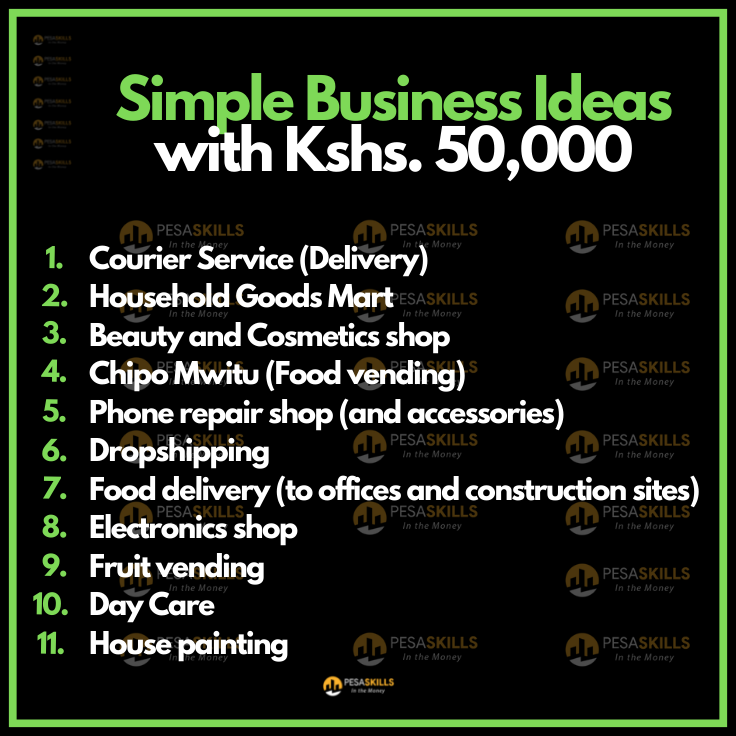
The table below shows a list of the businesses. The table also shows the requirements of starting the business and how much profit you can make per day.
| Business Name | Requirements | Estimated Daily Profits |
| Courier Service (Delivery) | A cheap motorbike or bicycle, a courier bag or box, helmet and protective gear, a smartphone | Kshs. 500 |
| Household Goods Mart | cheap furniture, décor pieces, small rented shop, general household items e.g. buckets, brooms, and carpets | Kshs. 1,000 |
| Beauty and Cosmetics shop | Rented space (small), cosmetic supplies | Kshs. 500 |
| Chipo Mwitu (Food vending) | Small rented space, an electric chips deep fryer, display cabinet, packaging materials, tomato sauce and chili sauce in bulk | Kshs. 1,000 |
| Phone repair shop (and accessories) | Phone repair skills, small rented shop with electricity, phone accessories | Kshs. 1,500 |
| Drop shipping | A social media page, e-commerce website, access to product vendors, marketing skills | Kshs. 1,500 |
| Food delivery (to offices and construction sites) | Cooking skills, small food containers, cooking space, cooking supplies, a variety of meals, delivery bicycle, social media page | Kshs. 1,200 |
| Electronics shop | Rented space, cheap electronics, social media page, e-commerce site | Kshs. 1,000 |
| Fruit vending | Rented space, variety of fruits, external display stand, running clean water, fruit cutting skills, packaging materials | Kshs. 800 |
| Day Care | Large rented space, kids’ toys, access to running water and clean toilets | Kshs. 2,000 |
| House painting | Painting skills, access to discounted paint, apron, paint supplies e.g., brushes and ladders | Kshs. 3,000 |
Business ideas in Kenya with 100k to 200k
Our research shows that some of the businesses that you can start with a capital of Kshs. 100,000 – Kshs. 200,000 include Laundry Mart, Furniture Mart, Décor and interior design shop, Cyber Café, Cake house, Convenience store (General shop or small wholesale), Clothing vendor, Pig farming, Massage parlor, Barbershop, Butchery, Gaming Arcade (Gaming shop), Milk ATM, and Water vending.
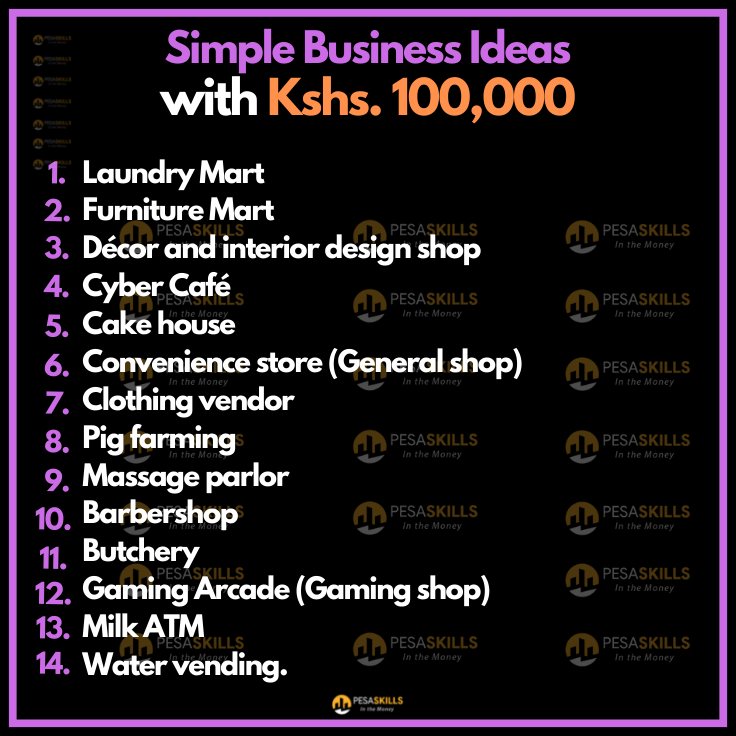
The table below shows a summary of the businesses. The requirements to start such businesses and estimates of profits per day are also given.
| Business Name | Requirement | Estimated Daily Profits |
| Laundry Mart | Rented shop with running water and electricity, a washing machine, iron box, large polythene bags, several hangers. | Kshs. 3,000 |
| Furniture Mart | Rented shop with outside space, a variety of furniture and decor pieces, metallic stands for display, good exterior signage, | Kshs. 2,000 |
| Décor and interior design shop | Interior design skills, a rented shop, variety of décor pieces, good signage, social media page | Kshs. 3,500 |
| Cyber Café | 10-15 computers, a printer, a scanner, a laminating machine, high-speed internet, several realms of copy paper, cyber software, computer and IT skills | Kshs. 2,000 |
| Cake house | Baking skills, rented shop with good display, baking supplies | Kshs. 2,000 |
| Convenience store (General shop or small wholesale) | Rented shop with exterior space, contacts of FMGC suppliers | Kshs. 1,500 |
| Clothing vendor | Rented shop, stock of new clothes, social media page, smartphone, e-commerce skills | Kshs. 2,500 |
| Pig farming | Several piglets, 50*100 sq. ft. land, water, commercial feed, leftover feeds. | Kshs. 1,000 |
| Massage parlor | Large rented space, masseuse skills, massage supplies, social media page | Kshs. 2,000 |
| Barbershop | Rented shop, haircutting skills, hair care products, washing chair, massage chair, air blower, haircutting machine | Kshs. 4,000 |
| Butchery | Rented shop with open display, meat supplier contacts, hanging hooks, weighing scale, cutting board, mincing machine, bone cutting machine, wrapping paper | Kshs. 1,500 |
| Gaming Arcade (Gaming shop) | Rented shop, 4-6 43” TVs, gaming consoles – PS4 or PS5, VR headsets, comfortable bench chairs, PlayStation games, a music system | Kshs. 2,000 |
| Milk ATM | Rented shop, a milk ATM, contacts for milk suppliers, running water, aprons, gumboots, measuring containers, clean plastic bottles. | Kshs. 1,500 |
| Water vending | Rented shop, a water purifying and packing machine, several large empty water bottles (18 liter), a delivery bike | Kshs. 2,500 |
Which is the best small business to start in Kenya?
There are businesses in Kenya that have been tested and tried and found to be reliable.
One of the main worries when starting a new business is whether it will succeed or fail. Part of the guarantee for success is how well such a business has been done by others.
Some of the businesses in Kenya that have the highest guaranteed chances of success include barbershops, florists, milk distribution, bottled water, fast food, daycare, car wash, cosmetics, and cooking gas retail.
Let’s look at each one in a bit more detail.
Barbershop
Barbershops are everywhere in Kenya. And this is for a good reason. They are among the most successful businesses.
To start a barbershop, you just need to be skilled in cutting hair and have a relatively good space.
Executive barbershops are particularly successful because they have high-profit margins due to the additional services that they offer.
Florist (and tree/plant nursery)
The flower business is among the oldest types of ventures.
Selling flowers is not easy but as long as you follow the key rules of the business then you will make a decent income.
One of the main rules is that it follows the seasons of the year e.g., Valentine’s Day and it may depend on location.
Hospitals and rich neighborhoods are some of the best places to set up a flower shop.
The tree nursery business is also very lucrative given the culture of having certain trees or other plants as decorative pieces growing.
Milk distribution
Milk distribution involves collecting milk from farmers in rural neighborhoods and selling it to milk vendors in urban areas.
In the recent past, the idea of Milk ATMs has caught on, especially in Nairobi and this has made the demand for fresh farm milk go high.
As more people set up milk ATMs and more customers switch from packet milk, the distribution business continues to be lucrative.
Bottled water
Similar to the milk business, the water business has grown in the recent past.
Previously people either drank tap water or bought water from supermarkets in large 20-liter bottles.
This trend has changed as now it is possible to buy purified water at a fraction of the cost while using your own bottle to refill.
As more people discover this option, the water bottling and purification business will keep growing.
Fast food
The fast-food business has been around for decades.
It is among the most straightforward businesses you can run as long as you have the right set of skills.
One side of the business that you can try is selling chips and related snacks at a small scale in busy neighborhoods or near learning institutions.
When done right, this business has a lot of foot traffic and requires little capital to start.
Daycare
The Daycare business keeps growing as more and more people move to urban areas.
In most urban neighborhoods, there is a need for affordable daycare as most parents have regular day jobs.
Given the demand is there and the market is expanding, there is no downside to a daycare.
The only way it would fail is if it is not in the right location or does not have the right facilities.
Untapped and unique business ideas in Kenya
As the market continues to change and evolve, there are always new business formats that arise.
Kenyan is currently experiencing such changes, especially with the rise of internet access. More households in urban areas are getting high-speed internet and this has opened new possibilities for starting businesses. Some of the untapped opportunities include online tutoring, digital marketing agencies, app-based food delivery, freelance writing, and drop shipping. These are also among the fastest-growing business in Kenya
Online tutoring
A large portion of Kenyans has embraced the possibility that learning can also occur via digital channels.
The Covid-19 period put a strain on physical learning and a lot of institutions resorted to using platforms such as Zoom, Google Meet, and Microsoft Teams to teach their students.
The experience of learning online removed the barriers that stood in the way of transitioning education into digital platforms.
Currently, there are many private tutors that deliver after-school lessons to children via such platforms.
So, as long as you are a good teacher, you can build a business out of online tutoring both locally and globally.
Digital marketing agencies
The increase in internet access means that a lot of customers are moving online.
It is very common nowadays for people to order things online from shops they have never visited or seen physically.
This is a new trend because just 6 years ago this would be considered too risky.
As businesses rush to set up e-commerce websites, and social media pages, and establish an online presence, they create demand for a lot of digital services hence the need for more digital marketing agencies.
Setting up an agency means you’ll be doing a lot of the complex tasks for businesses including graphic design, web design, SEO strategies, advert management, etc.
App-based food delivery
Food delivery apps are now a regular thing in major towns.
In Nairobi for example, there are a variety of options all competing to offer the best rates and varieties.
The result is that now more people are ordering food online and more traditional food vendors are transitioning into using these apps.
This has created an opportunity for pop-up restaurants. You can easily open a restaurant, focus on a few very well-done dishes, and easily make a regular income from it.
Freelance work
Access to the internet and advances in technology have also made the world more of a global village.
This is in terms of how work is distributed.
In Kenya, a significant number of people are freelancing on platforms such as Upwork, Fiverr, and Freelancer.com.
There is a broad range of skills that you can put into use including article writing, academic writing, graphic design, coding, virtual assistant, etc.
Even better, you can collect individuals with shared skills for instance in article writing, get work in bulk, and run it using the news agency model.
Dropshipping
In drop shipping, you market products owned by someone else and make a cut from it.
A common model is for you to identify a product supplier, set up your own e-commerce website, list the supplier’s products on the website, and then whenever someone places an order you simply tell the supplier to deliver it to the customer.
In Kenya, this is common in Jiji and Jumia. You will find a lot of vendors who simply list products they do not have but are in contact with the “store” owners who can quickly send them products when the need arises.
You can do this as well especially as more people buy products online.
The trick here is to use a lot of capital to market your website and social media pages so that eventually you can start selling your own products.
The worst business to start in Kenya
If you are looking to invest in a small business, it is good to learn from what is already there in the market. Some of the worst businesses to start in Kenya based on our research include wines and spirit shops, hawking second-hand clothes in town, a pet store, selling software, car hire, and travel agencies.
This list covers some of these businesses in more detail.
Wines and Spirits Shops
Selling alcohol is one of the most profitable businesses in Kenya.
However, when we talk of wines and spirits, there are a million and one hurdles to operating it. Wine and spirit shop attendants and owners are allegedly among the most harassed business people by law enforcement.
This is in addition to the various licenses and goodwill it takes to keep the business afloat.
Hawking Second-hand Clothes
The Mitumba business is well known in Kenya and it dates back decades ago. However, one specific side of mitumba business is difficult – hawking them in urban areas.
Nairobi is specifically hostile to general hawking and the county council police are intolerant of any violation of the city’s codes.
If you are planning to sell mitumba, find a legitimate business stall.
Pet Store
A pet store simply stocks supplies that people with pets use for instance cat and dog food, pet fashion accessories, etc.
In Kenya, this is a bad business because not that many people have pets. The pet culture in Kenya is also only appreciated by the upper-middle-class who have the means to spend on pets.
Rural and lower-income pet owners barely need anything bought from the shop to cater to pets.
Setting up such a business would thus only make sense if it is in a very upscale neighborhood and in a small form factor.
Software as a Service (SaaS)
SaaS simply means selling software platforms to people for different uses. There are millions of software companies globally that cater to various business and non-commercial needs.
For example, there is QuickBooks in accounting, and Oracle in ERP, among others.
The problem with software is that there are already these established competitors that are backed by billion-dollar companies.
It would thus be difficult to convince a firm like Safaricom to use your marketing software instead of them using software like Salesforce.
The only way to start a SaaS company is to build proprietary software that serves a very niche and local market.
For example, creating a platform to help farm-produce brokers do their jobs in a better way.
Car Hire
This is one of the businesses that sounds lucrative but has a lot of complex dynamics of operation.
In theory, a car hire simply involves lending out cars to people at a daily rate.
In practice, there are various challenges that include insurance hurdles, rogue drivers, maintenance, low business, and depreciation.
In the local market, their business is already crowded and it tends to do well in major cities near airports. If you visit any of the current airports, there are already very established players offering very affordable cars for hire.
Given the extent of capital you need to set it up, it may not be worth it.
Also, if you ask people to list their cars in exchange for a cut of the profits, it still would not be as profitable given the long periods of low demand you may experience vis a vis the constant maintenance and operational costs.
Travel agency
Going hand in hand with car hire in terms of bad business is a travel agency.
A travel agency is set up to help people arrange for their travel including booking flights, organizing cars, and setting people up in hotels and destination experiences.
Currently, the biggest problem of the travel agency business in Kenya (and globally) is that information is available everywhere.
In the past, these agencies thrived because not many people knew about different destinations and how to find fun things to do there for example.
Nowadays, it takes a few clicks of Google or Instagram and you have most of the information you need to travel anywhere in the world.
Starting such a business also needs more capital than before which may not easily generate profits.
You will need for instance to visit a lot of the destinations locally, take great pictures, set up a website, negotiate below-market rates, and do a lot of marketing.
It becomes even harder when you have to compete with established multinationals such as TripAdvisor and Airbnb.
Also, the travel booking business is saturated with hundreds of brokerage services for flight tickets.
Should you start a small business? Is it worth it?
Your small business could be a lie.
What lie are we referring to?
Well, the lie that your small business will turn into something worthwhile. Worth your time, money, and effort.
Kenya, while not an isolated case, has a lot of struggling small businesses ranging from the sale of spare parts, the mitumba vendors, mama mboga vibandas, etc.
A debatable issue surrounding these businesses is the amount of value they add compared to the efforts the owners put in.
The growth conundrum
The primary reason why small businesses are considered a lie is the growth rate.
A worthwhile business should eventually become a self-sustaining venture that not only earns the owner income but generates wealth that goes beyond the owner.
Most small businesses rarely get past their third year of operation and those that survive experience minimal growth.
The owners treat them as sources of consistent income but fail to expand them meaningfully. The lack of growth could be due to many factors but overall, it means the business may not be worthwhile.
What is an example of a worthwhile business?
Well, a practical example by Vusi Thembekwayo is a small mini-mart around the neighborhood growing to become a supermarket and eventually a multi-national retail giant like Shoprite.
Missing adaptability
This has more to do with the mentality of small businesses than the type of business itself.
Majorly, most small businesses in Kenya follow a similar path of idea generation, growth, and innovation.
There is also a tendency to follow investment waves like the Quail farming business and the greenhouse land schemes.
Adaptability means radical innovation including embracing the power of technology for business.
Unconventional ideas often grow rapidly into formidable businesses because they pose a unique value to the customer and experience lesser competition.
For example, it is easier to grow a motorcycle tracker manufacture and installation business than a motorcycle spare part selling business.
Learning and unlearning
An insightful perspective by Vusi Thembekwayo is that while business plans are written today the same way they were written 30 years ago, the execution part needs to be reinvented.
This is how most small businesses lose their traction because unless they adapt fast enough, they will never grow substantially.
The underlying idea is that small business owners will make their effort worthwhile if they learn and unlearn how to manage their investments towards growth.
Start small but grow big
It is not wrong to start small but lacking the motivation and technical knowledge to grow is a problem.
Again, this is looking at the bigger perspective of what a business is supposed to achieve for small scale investors in the long run.
Failing to grow makes your small business a lie. You will invest a lot in time, money and effort but get a raw deal in terms of sustainable returns.


